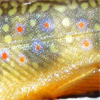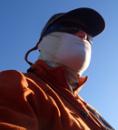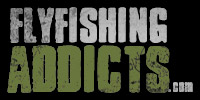REALTIME FLOWS  U. Kern: n/a cfs
U. Kern: n/a cfs
 L. Kern: 1341 cfs
L. Kern: 1341 cfs
 E.W: 312 cfs
E.W: 312 cfs
 U. Owens: 108 cfs
U. Owens: 108 cfs  L. Owens: 496 cfs 09/02/19 1:15 PM PST
L. Owens: 496 cfs 09/02/19 1:15 PM PST
New to FlyFishing any advice appreciated
9 posts
• Page 1 of 1
New to FlyFishing any advice appreciated
A buddy of mine invited me to go up to Portal Forebay for the opening weekend and learn how to flyfish. After about 10 min. of being in the float tube and trying every ounce of my instinct to break the habbit of using my reel, I fell in love. Though it wasn't until noon Saturday i finally hooked my first brook trout on a fly, i knew i would put my bait rod away maybe for good. I was basicaly trolling with the fly while paddling in the float tube. This is the only technique i know. I was hoping someone good give me some advice on techniques for High Sierra stream and high elevation lake fishing. My Dad and I are heading to Lundy lake for fathers day weekend. We plan on going to june lake loop and hiking in to some of the upper lakes and probably following Rush Creek from Grant L. I would love to learn patterns and what types of flies to use while we are in the high country........PLEASE HELP A ROOKIE OUT. Any advice would be great.
- jaredely77
- Posts: 5
- Joined: May 29th, 2013, 1:22 pm
Re: New to FlyFishing any advice appreciated
Following Rush Creek upstream or downstream from Grant? There's a HUGE difference in the two sections of water. Welcome to the forum.
"You can't keep a good Dr down."
Days On The Salt in 2017 - 114
Days On The Salt in 2018 - 39

Days On The Salt in 2017 - 114
Days On The Salt in 2018 - 39

-

DrCreek - Posts: 1417
- Joined: January 31st, 2008, 9:46 pm
- Location: CA
New to FlyFishing any advice appreciated
I would start by watching casting videos on YouTube, eventually join a FF club and get some lessons. I would continue to float tube, Silver lake is not bad on the June lake loop. Float tubing will be less frustrating than trying to cast among the trees on Rush above Grant. You might also want to try East Walker it it bigger water might be easier to cast. I have not fished Lundry so I can not comment.
Rasputinj
- Rasputinj
- Posts: 543
- Joined: October 8th, 2011, 9:06 pm
Re: New to FlyFishing any advice appreciated
I can't speak to the waters you're heading to, but I would like to say welcome to your new addiction! 
How do you tie the fly to your hooks without killing them with the thread? I keep cutting them in half.
-

darrin terry - Posts: 3369
- Joined: July 26th, 2008, 8:47 am
- Location: Locale: NoCal
Re: New to FlyFishing any advice appreciated
Welcome to the addiction. I started by slow trolling streamers behind a float tube, then watching darn near every fly fishing video on YouTube. It really came together when I had a chance to learn from some of the folks on the forum.
As to saying goodbye to the spin gear--- After sitting in the garage for 4+ years, I sold it all at our garage sale this past weekend. Didn't shed a tear.
As to saying goodbye to the spin gear--- After sitting in the garage for 4+ years, I sold it all at our garage sale this past weekend. Didn't shed a tear.
"We're a cross between our parents and hippies in a tent...."
180 Degrees South
180 Degrees South
-

WanderingBlues - Posts: 5299
- Joined: December 2nd, 2009, 10:49 am
- Location: Living in a Tin Can
Re: New to FlyFishing any advice appreciated
Welcome to the fun world of fly fishing. I started fly fishing a little over 13 years ago after a lifetime of spin fishing. I took a class offered by a local fly fishing shop where I learned about the equipment, some casting basics, fly selections and reading the water (where the fish live and feed in a stream). Shortly after that, I headed to a small high country creek and caught some goldens. Of course I learned how spooky they are first and, finally, when I could get my fly on the water without spooky them, they were very willing to come up and eat the dry fly I was tossing to them. Shortly after that, I joined a local fly fishing club (Kern River Fly Fishing Club in Bakersfield) and started attending meetings and going on outings. They had a nice mentor program where I got to partner up with experienced fly fishermen and those trips really helped my crawl up the learning curve. After that I tried to fish as often as I could, sometimes by myself and sometimes with others. I browsed around the internet reading articles and watching videos trying to soak in as much as I could. I took a couple of guided trips which really started cementing in the techniques, especially casting and line control (mending). I would strongly suggest that you find a local club to join and take advantage of all they offer. Most clubs are set up to help you learning casting and fishing techniques and they should embrace a beginner.
Good luck. Hope you enjoy the ride.
Good luck. Hope you enjoy the ride.
Life is good. Eternal life is better!
Richard
Richard
- RichardCullip
- Posts: 4052
- Joined: February 23rd, 2008, 10:55 pm
- Location: Poway, CA
Re: New to FlyFishing any advice appreciated
A few decades ago, typical ways to learn about fly fishing were reading books, hiring a guide, and / or joining a fly fishing club. Recently, the addition of videos has offered more possibilities, but being a 'reader', I find videos less informative than books.
Here is my plugs for books. Books give a great option to learn inexpensively. I don't learn by hiring guides since I can not afford to learn that quickly (or with such a price tag). Your circumstances are likely different. Good fly fishing books tell what the circumstances are for the trout's feeding, what food they are eating, what flies represents that food, and how to present the fly so it imitates the food and catches fish. Of course, everything in the last sentence changes from hour to hour, location to location, and season to season. I could show anyone how to catch a trout at any time. However, a good book gives the information that allows a fly fisherman to develop a broad background to catch fish use various methods at any time. More importantly, it tells what to look for when you are at a location, so you can apply the knowledge for local conditions.
If you like the read, the following books will serve you well. Some titles may not be exact, but if you do an online search, the books will be found (usually used).
Al Kyte Fly Fishing, Simple to Sophisticated. This cover fishing techniques from the easiest ones to the hardest. The suble difference make a big difference in catching results.
Gary La Fontaine - anyone of his books. His writings are the most comprehensive based on fish behavior. As research, he uses underwater divers to observe fish behavior to flies and presentations.
Brooks (Joe or Charles) - Nymph fishing for larger Trout. Nymphing will likely catch more fish for you than any other technique. The great part of this book is a review of all the published nymphing techniques. This books gives an overview. If you want more information, you can go to the original authors.
My suggestion is to have more information in your mind than you currently can use. However, when a technique starts to work, trout are caught, then your next learning steps are well on the way. Most of the books have good information about lake (stillwater) fishing, but lake fishing has the tendency to be harder since the fish move more. In general, a good lie in a stream / river will always hold fish. In lakes, you have to search more.
Fish a lot. Read a lot. It may take a few years, but eventually the information starts to connect. Wow!
Ants
Here is my plugs for books. Books give a great option to learn inexpensively. I don't learn by hiring guides since I can not afford to learn that quickly (or with such a price tag). Your circumstances are likely different. Good fly fishing books tell what the circumstances are for the trout's feeding, what food they are eating, what flies represents that food, and how to present the fly so it imitates the food and catches fish. Of course, everything in the last sentence changes from hour to hour, location to location, and season to season. I could show anyone how to catch a trout at any time. However, a good book gives the information that allows a fly fisherman to develop a broad background to catch fish use various methods at any time. More importantly, it tells what to look for when you are at a location, so you can apply the knowledge for local conditions.
If you like the read, the following books will serve you well. Some titles may not be exact, but if you do an online search, the books will be found (usually used).
Al Kyte Fly Fishing, Simple to Sophisticated. This cover fishing techniques from the easiest ones to the hardest. The suble difference make a big difference in catching results.
Gary La Fontaine - anyone of his books. His writings are the most comprehensive based on fish behavior. As research, he uses underwater divers to observe fish behavior to flies and presentations.
Brooks (Joe or Charles) - Nymph fishing for larger Trout. Nymphing will likely catch more fish for you than any other technique. The great part of this book is a review of all the published nymphing techniques. This books gives an overview. If you want more information, you can go to the original authors.
My suggestion is to have more information in your mind than you currently can use. However, when a technique starts to work, trout are caught, then your next learning steps are well on the way. Most of the books have good information about lake (stillwater) fishing, but lake fishing has the tendency to be harder since the fish move more. In general, a good lie in a stream / river will always hold fish. In lakes, you have to search more.
Fish a lot. Read a lot. It may take a few years, but eventually the information starts to connect. Wow!
Ants
- Ants
- Posts: 718
- Joined: May 2nd, 2013, 7:04 pm
Re: New to FlyFishing any advice appreciated
Steve Schalla's Site is a great resource for locations and patterns to use in that and other Sierra waters:
http://stevenojai.tripod.com/june.htm
In my experience, experience is the best teacher...
PT/TB
http://stevenojai.tripod.com/june.htm
In my experience, experience is the best teacher...
PT/TB
Daughter to Father, "How many arms do you have? How many fly rods do you need?"
http://planettrout.wordpress.com/
http://planettrout.wordpress.com/
-

planettrout - Posts: 1607
- Joined: December 6th, 2008, 11:22 am
- Location: Los Angeles, CA / Pullman, WA
Re: New to FlyFishing any advice appreciated
Thanks Gentlemen I look forward to my new found passion and larning this awesome sport........
- jaredely77
- Posts: 5
- Joined: May 29th, 2013, 1:22 pm

